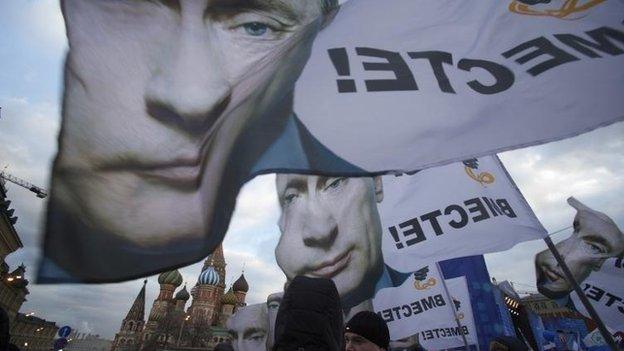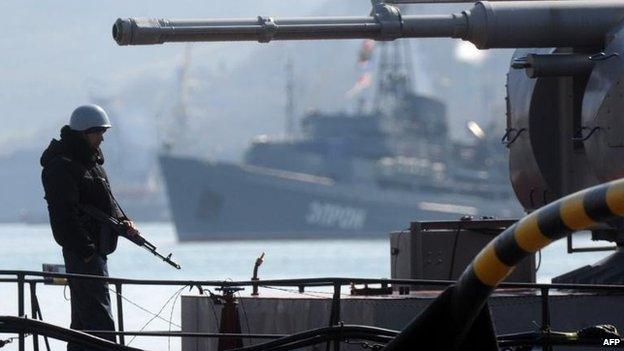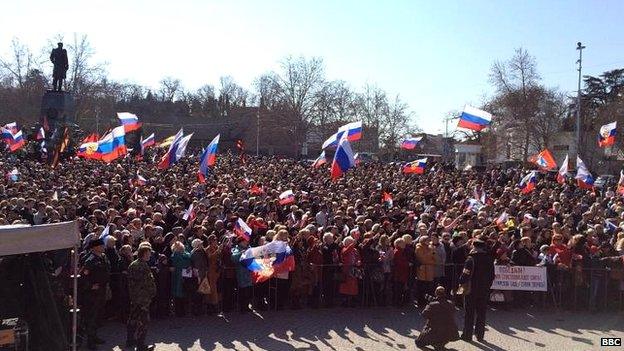Ukraine officer 'killed in attack on Crimea base'
- Published
Ben Brown reports from outside the Simferopol base where automatic gun fire was heard
Ukraine's military says an officer has been killed in an attack on a base in Crimea, the first such death since pro-Russia forces took control in February.
Ukraine has now authorised its troops to fire in self-defence.
The attack came shortly after Russian President Vladimir Putin and the leaders of Crimea signed a bill to absorb the peninsula into Russia.
Western powers condemned the treaty and a G7 and EU crisis meeting has been called for next week in The Hague.
The Ukrainian crisis began in November last year after pro-Moscow President Viktor Yanukovych abandoned an EU deal in favour of stronger ties with Russia. He fled Ukraine on 22 February after protests in which more than 80 people were killed.
'Military stage'
An eyewitness told the BBC that armed men arrived in two unmarked vehicles, storming the base in Simferopol and firing automatic weapons.
After a standing ovation, President Putin told parliament that figures from the Crimea vote were "more than convincing"
The Ukrainian government said a junior officer who was on duty in a park inside the base had been killed and another officer injured. A third serviceman had leg and head injuries after being beaten with iron bars, it said.
The government said the commander of the unit was captured by men wearing Russian uniforms.
Defence ministry spokesman Vladislav Seleznyov told Reuters the attack was by "unknown forces, fully equipped and their faces covered".
The Ukrainians had had their IDs, weapons and money confiscated, he said.
Interim Prime Minister Arseniy Yatsenyuk told an emergency government meeting: "The conflict is shifting from a political to a military stage.
"Russian soldiers have started shooting at Ukrainian military servicemen and that is a war crime."
Reports from the Crimean news agency, Kryminform, said a pro-Russia defence force member had been shot dead.
Crimean police later said both Ukrainian and pro-Russian forces had been fired on from a single location and that one Ukrainian was killed and one injured, and one pro-Russian was killed and one injured.
None of the accounts can be independently confirmed.
The BBC's Mark Lowen, in Simferopol, says up until now only warning shots have been fired amid a truce - but it appears the tension has boiled over and there are fears that further clashes could follow.
'Glory to Russia'
Earlier, Mr Putin told Russia's parliament that Crimea had "always been part of Russia" and in signing the treaty he was righting a "historical injustice".

After Mr Putin's speech a huge "We are together" rally was held in Moscow's Red Square

A sailor stands guard on Ukraine's Slavutych military ship in Sevastopol

Pro-Russia supporters gathered in Sevastopol in Crimea as President Putin's speech was relayed
The BBC's Richard Galpin in Moscow says an audience of loyalists rose to their feet on several occasions, as Mr Putin accused Western countries of constantly trying to push Russia into a corner and of being hypocrites.
But our correspondent says there were conciliatory words, too - Mr Putin stressed Russia did not want to "divide" the rest of Ukraine.
The president later appeared before crowds in Moscow's Red Square, telling them: "Crimea and Sevastopol are returning to... their home shores, to their home port, to Russia!"
He shouted "Glory to Russia" as the crowds chanted "Putin!"
The predominantly ethnic-Russian region of Crimea held a referendum on Sunday in which it said 97% of voters had backed joining Russia.
Crimea's leaders declared independence on Monday and Russia acknowledged it as a nation.
'Land grab'
Ukraine's interim President Olexander Turchynov said Russia's actions were reminiscent of Nazi Germany's takeover of Austria and the Sudetenland.
The Ukrainian foreign ministry said: "We do not recognise and never will recognise the so-called independence or the so-called agreement on Crimea joining the Russian Federation."
Western powers have declared the Crimea referendum illegal and roundly condemned Tuesday's treaty.
US Vice-President Joe Biden, speaking earlier in Poland, said Russia's involvement in Crimea was "a brazen military incursion" and its annexation of the territory was "nothing more than a land grab" by Moscow.
The White House said Monday's round of targeted sanctions on Ukrainian and Russian officials by the US and EU would be expanded.
"This action - the results of the referendum and the attempt to annex a region of Ukraine - will never be recognised by the United States and the international community," spokesman Jay Carney said.
President Putin's official spokesman Dmitry Peskov says Ukrainian soldiers need to make a choice about joining the Crimean forces or leaving the peninsula.
UK Prime Minister David Cameron said: "It is completely unacceptable for Russia to use force to change borders on the basis of a sham referendum held at the barrel of a Russian gun."
German Chancellor Angela Merkel said that the referendum, the declaration of independence and Crimea's "absorption into the Russian Federation" were "against international law".
Nato Secretary General Anders Fogh Rasmussen said there was "no justification" for Russia to continue on its "dangerous path".
Are you in the region? Email us at haveyoursay@bbc.co.uk adding 'Ukraine' in the subject heading and including your contact details.